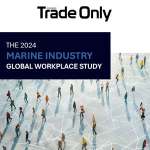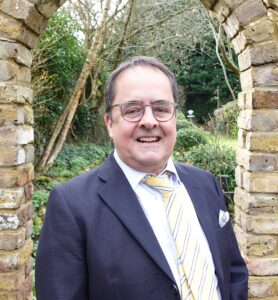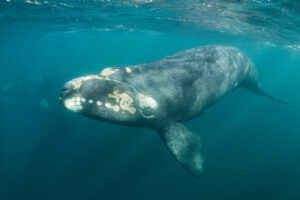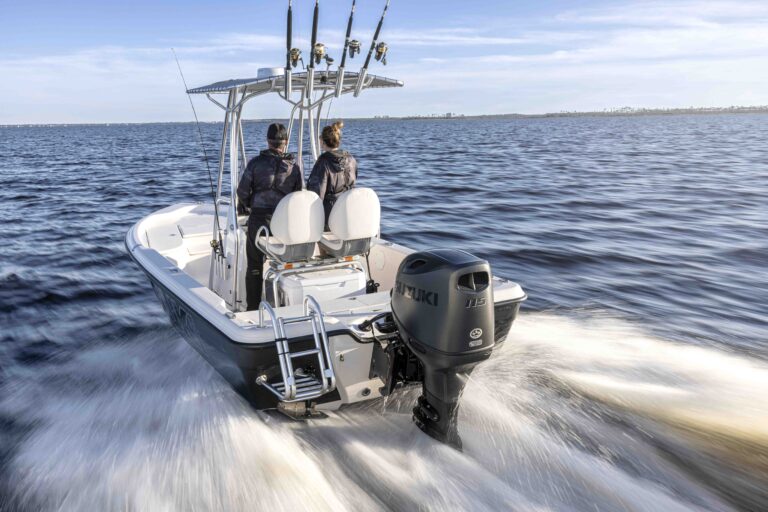Patty Lawrence has faced more than her fair share of challenges since taking over as education director for the International BoatBuilders’ Exhibition and Conference in 2021. First, the Covid-19 pandemic restricted attendance at the annual event at the Tampa Convention Center. Then, in 2022, Hurricane Ian forced the show to cancel at the last minute.
Still, Lawrence says the biggest hurdle she’s faced in the past three years has been meeting people involved in the boating industry. She works remotely from her home in Cincinnati. “I want to get to know the speakers in the industry better,” she says. “That’s probably my biggest thing. And the other thing is, I really feel passionate that the education programs should be of interest to the industry.”
Lawrence says she welcomes feedback about what people want to see and learn about during IBEX, and about the education and training programs overall. For this year, new educational programs are being unveiled, and there are more than 50 seminars scheduled for the show, which is scheduled for Oct. 1-3.
This interview has been lightly edited for clarity and space.
What is your boating background?
My dad introduced me to sailing, and then I started racing in college, which is where I met my husband. We bought a Thistle, which is a one-design dinghy, and raced all around the country. I was president of the class and then secretary. I did a whole lot of separate racing and now pretty much stick to home and am looking to go cruising more.
How about your professional background?
I’m a teacher by trade. I have a master of education, so I taught for a while. We lived in South Carolina, but I let my certification lapse, and it was just such a pain to get it back. Plus, jobs for English teachers were few and far between.
What was the next step?
Because of my sailing background and involvement in US Sailing, I started doing sailing seminars for the public at consumer boat shows for a number of years, and I managed to find my way to IBEX.
What drew you to the role with IBEX?
I was looking for full-time work, I liked the industry, and I liked the IBEX team. The public sailing seminars were part time, and they eventually just kind of died off, which is truly unfortunate because that kind of education for the public is something that I think is sorely needed to draw more people to sailing.

IBEX attendees are designers, naval architects, manufacturers and other experts. Is it intimidating to try to educate them?
Absolutely. I don’t pretend to educate them, and I don’t ever pretend to be something that I’m not. When I meet them, it is intimidating because they are just brilliant, but they’re also kind, and they’re thoughtful, and they’re very understanding about where I’m coming from. I’m fortunate to work with a thoughtful and smart education committee, and together we develop the program’s curriculum. These experts in the field not only provide their ideas, but they are also invested in the program’s success. They understand the value of the program and, in my experience, have been open, and delightful to work with. In addition, each year an incredibly talented group of speakers and other professionals share their insights on the technical issues that surround the industry through our call for proposals.
Who are some of the people that have impressed you with their knowledge?
Aaron Porter, the editor of Professional BoatBuilder magazine. He’s terrific. He understands the industry extraordinarily well. Jeff Bowles is a naval architect who spent many years at Donald L. Blount and Associates and is now at Leidos’ Gibbs & Cox. He’s a fantastic resource, as is Jeff Wright from Gougeon Brothers. He knows the program inside and out, and has great suggestions with topics and thinking about trends and things all year long. And Jeff Wasil from the National Marine Manufacturers Association has been a great help with sustainable fuels and carbon reduction.
How does your boating background help in your current role?
I understand the boating part of it, and we have an education committee that’s made up of some people who just care deeply about the industry. They care about the program, and they’re fabulous to work with, but they don’t want to be the ones running around making sure all the mechanics of the seminars happen. That’s where I come in. Prior to IBEX, I was a teacher, and I have always been a boater and sailor, so this work nicely blends my skill set and interests.
What is your goal with the IBEX education programs?
The education program always strives to assess the latest trends and present them in a thoughtful and organized manner. IBEX is unique in that it is the only place where all aspects of the industry come together, and that synergy makes the program special. It is a mix of what’s new, best practices and core skills, so there is something for everyone, from naval architects and engineers to the technicians on the shop floor.
Are some subjects covered annually because there are always updates?
Last year, I was surprised. We had a seminar on corrosion, and it was very much a core skill and the room was full. It’s also about best practices. So this year we have seminars on best practices for laying up composites. Other perennial topics include updates on standards and regulations. Fire is a pertinent topic that is covered in terms of marinas and on vessels. The annual roundtable on boatyard operations is always well-attended and focused on current issues. Survey and repair topics remain important, so we have seminars on gelcoat repair, corrosion, avoiding systems problems, insurance issues, installing sonar and other topics. This year’s schedule includes seminars such as Avoiding Legal Pitfalls Through the use of Robust Record Keeping Practices, Protecting Your Intellectual Property, and Manufacturing Facility Improvements.
Are you working with the American Boat & Yacht Council and other groups to help develop industrywide standards?
Tim Murphy from ABYC is on the education committee, and ABYC president John Adey is fabulous to work with on all fronts. I also work with ABYC accreditation director Sarah Devlin for career day and other educational events.
Is part of the plan for education to develop industrywide standards for manufacturers?
I met with some presenters, and they were just talking about how the industry is so self-regulated and how much things can vary from manufacturer to manufacturer. I want the program to be of interest to the industry and something that they want to attend or they want to send their employees to.
What are some of the new attractions for this year?
The main stage is going to have a variety of topics, including a session on workforce challenges with Soundings Trade Only Group vice president Michele Goldsmith. Other topics include Visionary Leadership Panel Discussions: The Driving Force Behind the Marine Industry’s Small and Medium-Sized Businesses, with Steve Heese, John Giglio, Robert Oswell and other moderations. Another Main Stage panel discussion will be Avoiding Contradictions in Technology, which delves into the issue of producing boats that boast impressively long hull life with some technology that has a shorter lifespan. This discussion will be moderated by Aaron Porter and Ben Stein. Of course, sustainability will be included, with an update from Jeff Wasil of NMMA and Joe Lynch of ICOMIA with some of the technical outcomes from the propulsion decarbonization study.
Are there current technologies that seem to be gaining momentum?
The marine industry is constantly evolving, and the education program reflects this with seminars on hydrogen, hybridization, foiling and ride control, hull design, renewable composites and 3D-printed parts. Noise reduction is important as we add more horsepower to the back of the boat, and two naval architects will address this issue. Of course, the show floor is a great place to see the trends. Remember when LED lighting made its debut, so lighting was everywhere? In the last few years batteries and new battery technologies have been a frequent sight.
What are you hearing about interest in electric propulsion and electrification?
I’m hearing mixed. I think there’s definitely a place for electrification, but I think show visitors are interested in sustainability. That might mean electric, but it also might mean hull shape. It might mean alternative fuels. It might mean how you reduce your carbon footprint when you manufacture, so I think there’s a definite interest in reducing the carbon footprint. But we’re not putting all our eggs in one basket. Hybrid is a popular subject. Even hydrogen is coming along.
How about the marina segment?
I’m learning more about the marinas and infrastructure that would be needed to support a larger variety of boats. If we’re going to electric and putting electric boats in marinas, what are we going to need for standards for that? What are we going to need to make sure the boats and marinas are safe? That could be its own educational track.
Is there a most rewarding part of the job?
I enjoy working with the education committee. It’s a diverse group, but the members are thoughtful. They look to the trends. They donate their time. When I’m not sure about something, it’s nice to have a few people to ping and ask, “Is this real or not? Is this a trend that’s coming?” The whole IBEX team is fabulous, as well.
Do you have a favorite educational topic?
I’m always curious, so I like to learn. My personal boat is a dinghy, but I don’t have systems, so I am always looking to learn more about them. My husband and I of course plan to get a bigger boat and go cruise for a long sail. It’s hard to point to one because there’s always something new, and IBEX has nine different tracks.
Can you tell us about the seminar tracks and how they work?
The tracks bring synergy to the program and allow our attendees to find what
matters most to them. Other industry education programs focus on specific areas like marinas or electronics, but at IBEX, all the great minds come together to offer an expansive education conference that reaches all parts of industry and ensures a well-rounded program. The 2024 tracks include Construction Methods and Materials, Design and Engineering, Marine Electrical Systems, Onboard Systems, Survey and Repair, Management Policy, Marina and Boatyard Operations, Marine Onboard Systems, and Sustainability. There is considerable cross pollination of ideas when you look at issues from various viewpoints. A bit of magic happens in the seminar rooms when people are free to share ideas.
What’s one of the newer topics for this year?
We were asked to host a seminar on noise reduction because manufacturers are putting more and more outboards on the back of boats. When they’re all running, some of those boats exceed Occupational Safety and Health Administration limits for sound levels. People are saying things like, “I can’t put my grandkids back there because it’s deafening.” Another one is transom reinforcements to hold all that weight with the big power. There’s also interest in sustainable composites and the life cycle of boats.
Do you also work with the National Marine Manufacturers Association or other organizations to develop the educational programs?
The NMMA, the Marine Retailers Association of the Americas and the American Boat Builders & Repairers Association help with seminars. The Society of Naval Architects and Marine Engineers hosts some as well, and the International Council of Marine Industry Associations is sending its technical consultant Patrick Hemp to this year’s show.
Is the show becoming more involved with developing curricula for vocational schools or other training programs?
When I was teaching, I taught in South Carolina at a two-year college, and I was in developmental studies. I enjoyed those students, and I think they need an advocate. I would encourage the industry to reach out to technical schools and let them know there’s a need. If they have somebody who can go help teach, it’s just building that relationship with the schools. Some of our education committee members are working with vocational schools, and I think that’s a fabulous program. Hopefully, at future shows, we can bring in more students and schools for career day.
IBEX hosts its own career day, right?
We host a Career Day on Thursday and have about 70 students signed up from three area schools. Last year was our inaugural event, and sponsors paid to host the students. They got swag bags, and we fed them lunch, and the students could sit down to talk with companies.
Did you get to talk to any of the students last year?
Yes, and you know, the students know what they want to do. They want to know how to take an engine apart, and they want to know how those electronics work. They say, “I want to work with my hands. I want to build things.” One crew I sat with had just seen a CNC machine, and they were so impressed by how it made a quarter-inch cut. Now they know they can get trained to work with something like that.
How much of a challenge is getting the word out aboutt training?
People don’t always know that’s an option. If you had the opportunity to sponsor a
cardboard boat race or a Little League team or do something in the community that says, “Hey, boating is great and you can have a career based on it,” it’s a tremendous opportunity.
The number of seminars this year is right around 50. How many proposals do you typically get?
Probably double that. The problem is, people submit things that aren’t appropriate — like they want to sell their product. They don’t understand that it’s education. Every marketer in the world wants to apply to teach a seminar. This is where the committee comes in. We look at attendee surveys from last year. We look at proposals. We flesh out some of our own topics. We don’t have a hard and fast number. If we get good proposals, we’ll offer the seminars.
Are there any that didn’t make the cut that were memorable?
I had one from someone who worked on a submarine back in one of the wars. It wasn’t quite a fit as an educational seminar, but I bet it would make a good story.
The show is the main event, but are there educational opportunities beyond Tampa that perhaps people don’t know about?
We host online education with IBEX 365, our year-round digital platform for exhibitor news, educational seminars, webinars and show-related updates. A handful of seminars will be recorded and offered after the show. I’m always seeking proposals, so I encourage the industry to submit them. The IBEX audience is vetted and interested.
Do the Tech Talk sessions take place during the show?
They were started at the beginning of the show in 1992 and evolved over time because they are an excellent way for exhibitors to showcase product on the show floor. This year we’ve expanded the schedule, improved the location and been able to work with more exhibitors to bring the latest product demonstrations to this fun and engaging format. Topics cover everything from repairing infused laminates, the latest in telematics, decking and 15 other interesting topics.
How long are the Tech Talk sessions?
This year, we’ve changed it up a little bit. Tech Talks used to be an hour long, but now there are some that are 30 minutes. There are also quite a few more this year than in previous years.
Are you using AI in any way for your education program?
No, but I have a seminar on it this year from a pair of young experts titled A Practical Guide to Maritime Applications of Artificial Intelligence, on Thursday morning.
Do you have many requests for sessions on how to make boating easier?
A consumer gets nervous about docking their boat, or they expect to have their boat behave like their car. If there’s somebody stressed about docking and we can come up with a way to help ease that stress, I think it would help them.
What are some other leading-edge technologies being featured at this year’s edition of the show?
There are so many. We have artificial intelligence, the latest in resin infusion, hydrogen fuels, hybridization, hull end of life, lithium battery technology, sustainability, and many more. The best way to keep up with it is from the IBEX website.
This article was originally published in the September 2024 issue.











